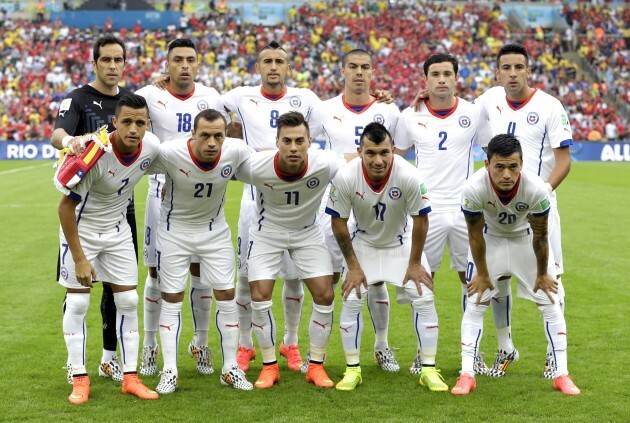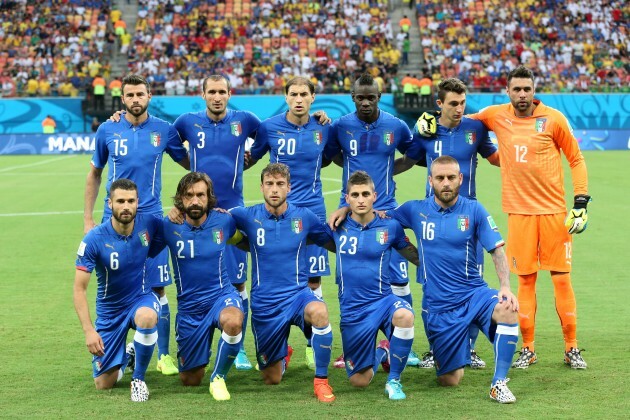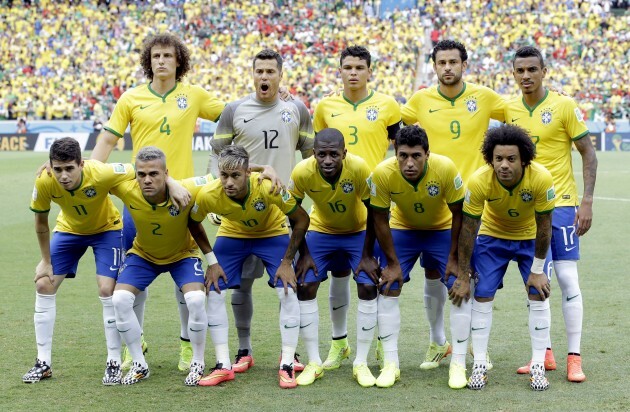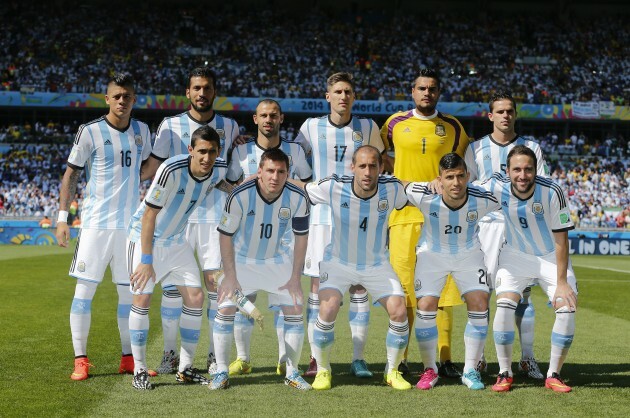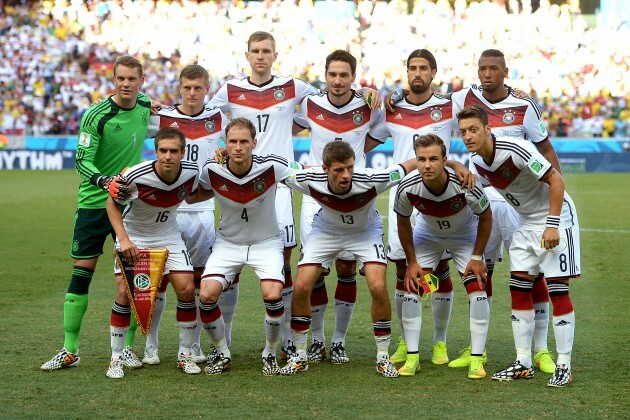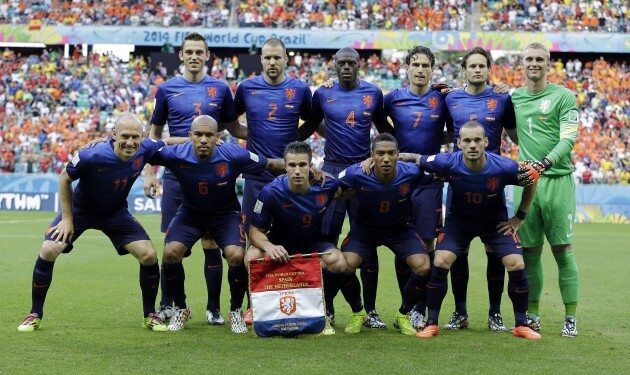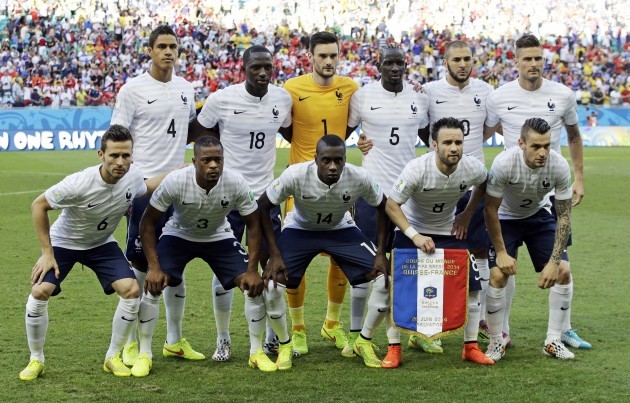7. Chile
Chile illustrated their main strengths against Spain, delivering a masterclass in pressing in the process. Many Spanish players, most notably Xabi Alonso, simply could not cope with their opponents’ intensity early on, forcing them into the kind of mistakes that led to the opening two goals. Yet there is, of course, more to Chile than mindless running. There was a palpable intelligence behind this well-deserved victory, as coach Jorge Sampaoli changed their system so that it more or less mirrored the formation that the Dutch applied so successfully against the Spanish. David Silva, Anders Iniesta and even Sergio Busquets were all effectively man marked, while Chile were also clinical on the break, exposing space on the flanks and showing remarkable energy to get bodies into the box on the relatively rare occasions they ventured into Spain’s final third. While winning the World Cup would still be a major shock, the South American side cannot be underestimated on the back of this performance. The one doubt about them though is how they perform against more pragmatic sides — their 3-1 victory over Australia was closer than the scoreline suggests, and they may struggle if they’re ever in a position where they’re required to break a team down.
Key player: Arturo Vidal
Movement: New entry
Random stat from second game: Chile beat Spain despite only having 44% of the possession and four shots on target compared with their opponents’ nine.
6. Italy
Effectively all that was good about Italy’s performance against England was reversed against Costa Rica. The underdogs defended from the front, pressing their opponents in the manner that the English failed to do, and thus preventing them from controlling the game in the process. The Costan Rican forwards rarely gave the Italians time on the ball, forcing them to go long and winning the majority of the subsequent 50:50s. The Azzurri simply looked like a different team from their opener — Mario Balotelli appeared disinterested for much of the contest and missed a rare gilt-edged chance, Andrea Pirlo had little time on the ball and was consequently unable to meaningfully influence the play, and his opponents’ defensive discipline meant Matteo Darmian could not make the penetrating runs from full-back that he favours. Yet most worryingly of all for Italy, the Costa Ricans thoroughly deserved their victory and seldom looked in danger of surrendering their lead after establishing it. If they weren’t dark horses to repeat their feat of 2006 and win the tournament before, they certainly are now.
Key player: Andrea Pirlo.
Movement: Down two places.
Random stat from second game: Costa Rica committed 24 fouls against Italy, over twice as many as Cesare Prandelli’s side (10).
5. Brazil
Like their display against Croatia in the opening game, Brazil delivered a laboured performance against Mexico, however unlike that game, they did not benefit from any especially favourable refereeing decisions and failed to earn the three points in the process against a dogged Mexican outfit. It was a disappointingly conservative display from Luiz Felipe Scolari’s side. The doubts surrounding Hulk’s fitness meant he was left out of the starting XI, with a defensive midfielder, Ramires, coming in in his place. It was no surprise that they subsequently struggled to create many chances. Their pragmatic set-up meant forwards Neymar and Fred saw little of the ball in dangerous positions, and they were subsequently forced to feed off scraps and half-chances at best. Of course, Brazil’s fantastic home record is still intact, and they were playing a useful Mexico side, so alarm bells won’t be ringing too loudly as of yet, however their supporters will be hopeful the team can get their campaign back on track today. Hulk’s imminent return should improve them significantly, though it’s doubtful as to whether it will be enough to make up for their creative deficiencies elsewhere.
Key player: Neymar.
Movement: Down two places
Random stat from second game: Brazil’s draw means they are now unbeaten in their last 39 games on home soil — they last lost 1-0 in a 2002 friendly against Paraguay.
4. Argentina
If Argentina’s performance against Bosnia was unconvincing, then this display was even more so. In fairness Alejandro Sabella’s men though, they came up against an incredibly well-organised Iranian team. Nevertheless, Carlos Queiroz’s side highlighted Argentina’s limitations throughout the game. Realising that their key men are the likes of Lionel Messi and Sergio Aguero, Iran wisely sat deep and denied these talented individuals space by flooding the middle of the field, meaning Argentina’s rare chances largely emanated from the flanks where they are not especially strong going forward. Moreover, both Aguero and (until the goal) Messi had two of their most ineffectual games for Argentina. Iran even grew in confidence and had the better chances in the second half, before the team’s 26-year-old star man won them the game with an unstoppable strike late on. The performance doesn’t bode particularly well for Argentina’s chances, but like all top teams, they kept going and got the job done eventually, which is a useful habit to have.
Key player: Lionel Messi.
Movement: Up two places.
Random stat from second game: Iran had only 30% of the possession against Argentina, yet still managed to muster eight shots in the game, four of which were on target.
3. Germany
Germany were arguably the most impressive-looking team of the tournament after the first round of matches, yet even in beating Portugal 4-0, there were hints of weakness within their ranks, and against Ghana, these issues became more pronounced. In contrast with the error-prone Portuguese, the Ghanaians were far more disciplined and energetic. Germany struggled to cope with their high tempo and were continually exposed down the right, with Mario Götze consistently failing to track back, frequently leaving makeshift left-back Benedikt Howedes exposed as a result. Moreover, Philipp Lahm looked uncomfortable in his defensive midfield role, though Bastian Schweinsteiger and of course Miroslav Klose both had a positive impact when they came on to save the day. The fact that the Germans can call on such quality from the bench is therefore one of the key reasons why they’re still considered among the favourites despite Saturday’s setback.
Key player: Toni Kroos
Movement: Down two places.
Random stat from second game: Germany have won their last seven World Cup opening matches, but still have only won their second group game once since 1994.
2. Holland
For the opening 45 minutes of their most recent match, the Dutch were made to look ordinary owing to a strong Australia performance. Holland’s high defensive line was continually exposed, most notably for Tim Cahill’s wonder goal. Suddenly, all those tipping them to win the competition were looking very silly indeed. However, Holland delivered a much-improved second-half performance, largely thanks to a change in their system that was prompted by an injury to Bruno Martins Indi. The defender was replaced by winger Memphis Depay, the tempo consequently slowed and Holland, now operating in a 4-3-3 compared with a 3-5-2 previously, were less susceptible to Australia’s quick counter-attacks. With the game considerably more cagey, Holland grew increasingly dominant and eventually showed the requisite class to overcome their spirited opponents. And tellingly, it was the substitute Depay who made a match-winning contribution, creating Holland’s second goal before scoring the winner himself. Accordingly, the triumph illustrated Louis van Gaal’s game intelligence and knack for making the right substitutions, and this considerable asset is one of the primary reasons why they remain as high as number 2 on this list, while another is the potent finishing ability of Robin van Persie and Arjen Robben.
Key player: Robin van Persie.
Movement: No change.
Random stat from second game: There were 43 fouls in the game (25 by Holland and 18 by Australia), while there were only two offsides (one apiece).
1. France
France have now scored eight goals in two games and of the sides tipped to compete for the trophy, they’re the only ones who have delivered two totally convincing performances so far. That said, their opposition has been conspicuously weak. Like Honduras before them, Switzerland contributed significantly to their own downfall. Ottmar Hitzfeld’s side naively played with overlapping full-backs, leaving their centre-halves with far too much space to cover against France’s three-man attack. To make matters worse, the Swiss midfielders often looked uncomfortable in possession and it quickly became apparent that the entire team were out of their depth, as France ruthlessly opened them up time and again on the counter attack. The French eased off in the dying stages, allowing their opponents to score twice, but that did not take the sheen off another emphatic victory. Didier Deschamps’ side are now many people’s favourites to win the competition, and with performances such as this one, critics’ optimism is certainly justified to an extent.
Key player: Karim Benzema.
Movement: Up four places
Random stat from second game: Karim Benzema now has nine goals in his last eight games for France.
Hovering just outside the top 7: Belgium, Colombia, Croatia.
Who do you think will win the World Cup?
